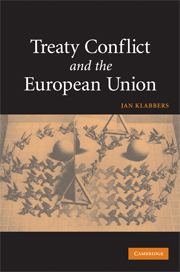Book contents
3 - The pre-Vienna Convention regime
Published online by Cambridge University Press: 03 February 2010
Summary
Introduction
Deceit is timeless. Machiavelli, in 1513, instructed his prince to tell little white lies whenever this would serve the national (or princely) interest. Over a century later, Grotius, often heralded as the founding father of international law, was well aware of the possibility of concluding conflicting alliances, as was his heir apparent, Emeric de Vattel. Earliermedieval lawyers had to come to terms with the validity of a local custom when set against the imperial rules of the Corpus iuris. The newly independent United States of America, in the 1770s, made a separate peace with Britain despite having solemnly pledged to France not to do so. And Hitler, never a good advertisement for decency of course, saw fit to accuse France and the Soviet Union of concluding a bilateral assistance agreement in 1935 which would be incompatible with their obligations under the 1925 Locarno Treaty – and that was after Nazi Germany and the UK had concluded a naval agreement which conflicted with their obligations under the Versailles Treaty.
While deceit may be timeless, this is not to say that all treaty conflicts are necessarily the result of deceitful intentions; indeed, sometimes negotiators do their utmost to prevent any conflict from occurring. Thus one of the more difficult points in the negotiations of the Atlantic Charter, the war-time agreement between US president Roosevelt and UK prime minister Churchill which set the scene for the post-war world order, was the trade paragraph: trying to reconcile the general idea of free trade with Britain's commitments of trade preferences for its empire.
- Type
- Chapter
- Information
- Treaty Conflict and the European Union , pp. 49 - 68Publisher: Cambridge University PressPrint publication year: 2008
- 1
- Cited by



